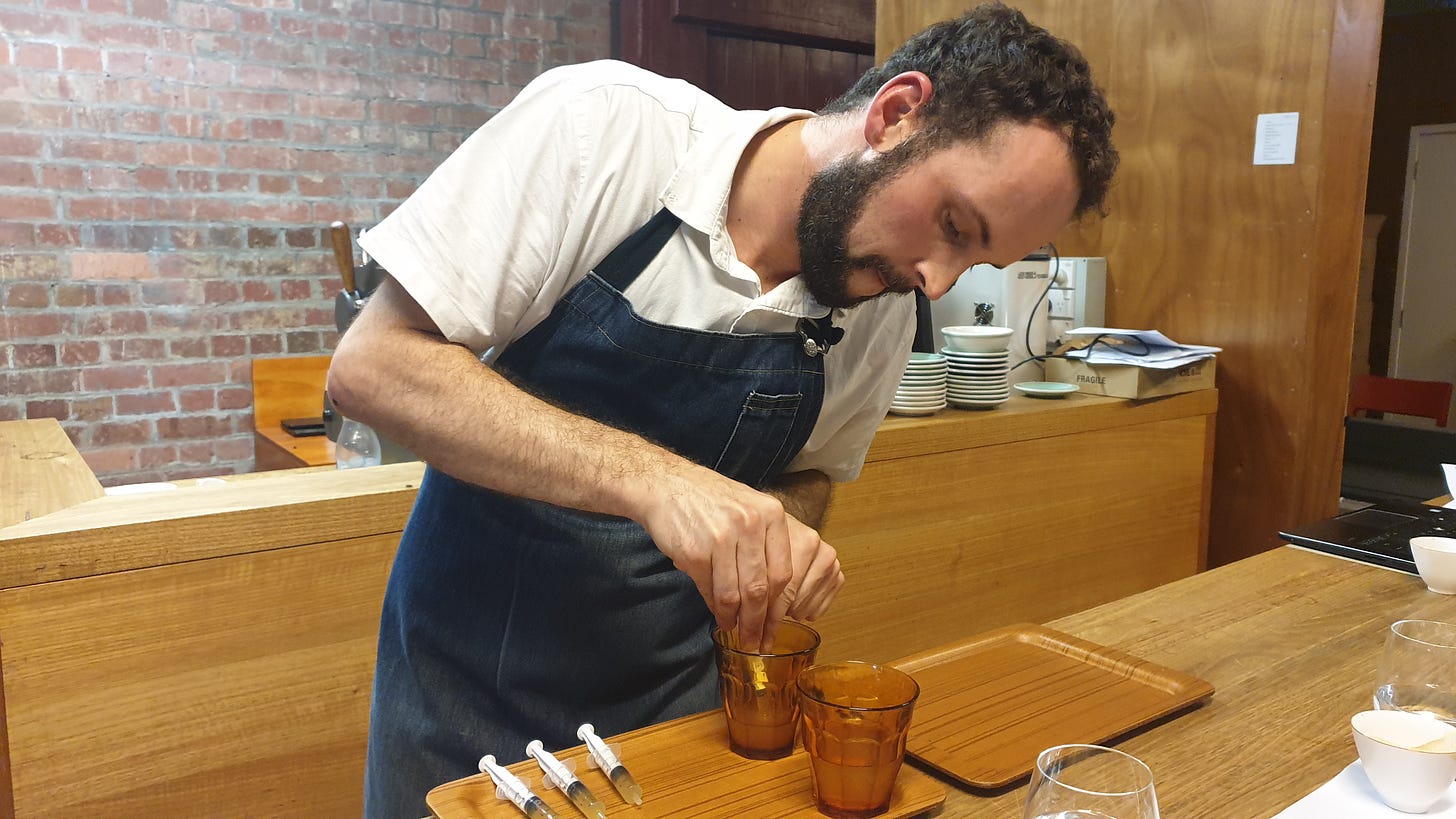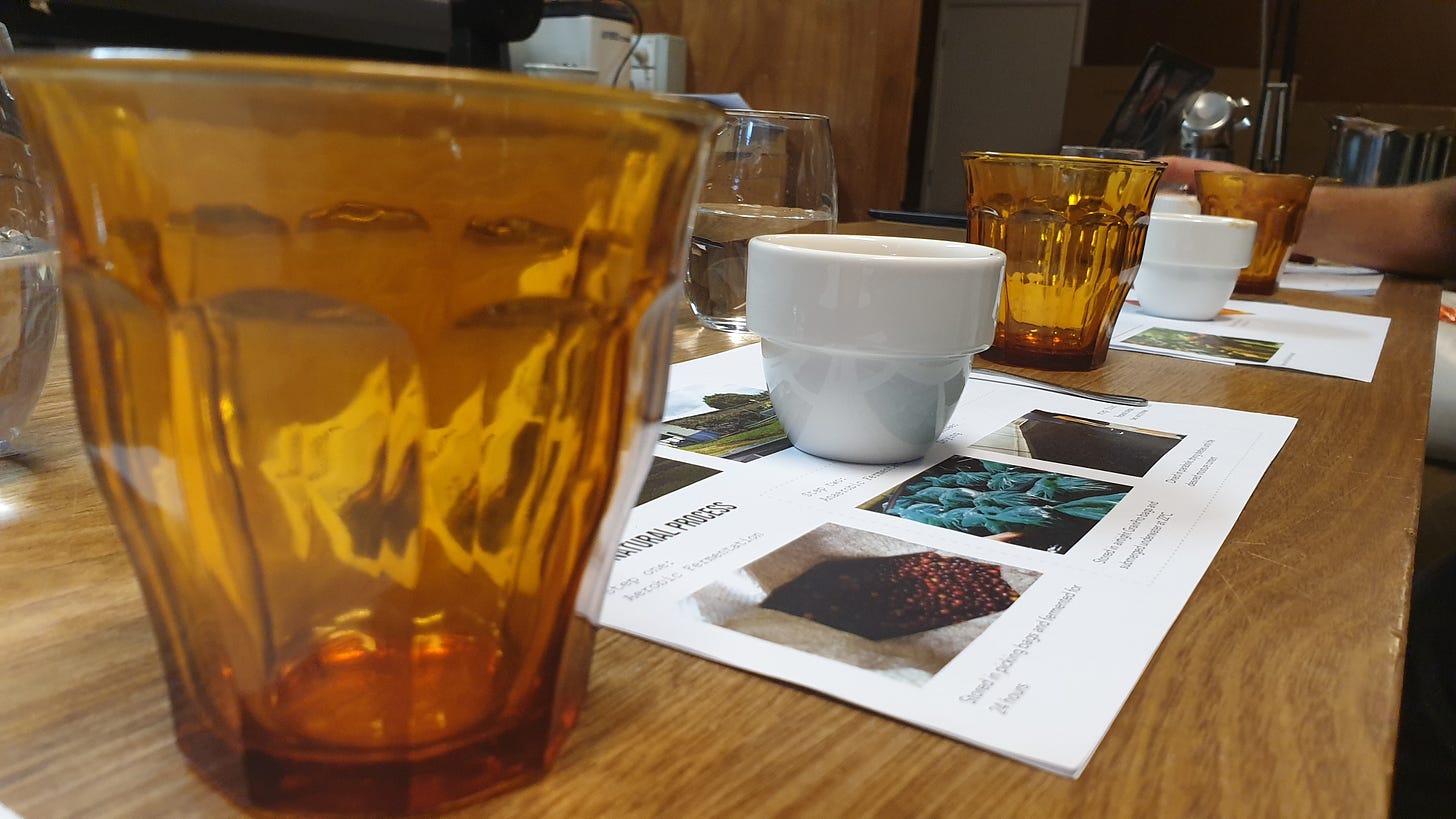On a gloomy, windy, yet warm autumnal day in Upper Hutt, competitors from all around Aotearoa gathered to compete at the 2021 Meadow Fresh New Zealand Barista Champs.
There was a definite nervous energy around the building, and as I walked up the stairs to the theater I pass competitors, supporters and organizers who all look like they were about to explode. This day was a long time coming. The Champs were postponed twice in 2020 due to COVID-19 lockdowns, so it was no surprise to see equal parts relief and terror on the faces of the team at the New Zealand Specialty Coffee Association who organised the event, and the competitors who had finally made it to game day.
I turned up 15 minutes before the show started. There’s a buzz on stage as everything got set up. Cameras, lighting, judges, sponsors, competitors were all doing last minute tweaks to get set. A modest but growing crowed take their seats while the song “Everything is Possible Now” plays almost unironically from the sound system.
The lights dimmed, the MCs took the stage, and the first competitor, Logan Collinge, got set for his 15 minutes of fame. Game on.
What is this all about?
I don’t work in the coffee industry, so I rocked on up to the event with some preconceived ideas on what this was about. I knew it was important to the competitors, and interesting to the industry, but I totally underestimated the broader impact of the Barista Champs.
It’s not just about slinging some shots to some choice choons. It’s about looking for the next ambassador for the New Zealand specialty coffee scene (pressure much?).
It’s about pushing coffee to new and wonderful places that make you rethink what coffee can be.
It’s about story telling.
It’s about bringing to life the vision of the farmers who grow coffee many thousands of miles away.
It’s about showcasing manaakitanga, expert knowledge, and uplifting the mana of everyone involved.
Competitors have 15 minutes to make three coffee courses for the four judges sitting in front of them. The courses include an espresso, a milk beverage (a flat white in most cases) and a signature beverage that contains coffee, but can use other ingredients to make a great drink.
While competitors make coffee for the judges in front of them, there are another four or five judges floating around, watching how the coffee is made, making sure everything is accurate and done consistently. They are marking the coffee, the performance, the words used to describe the coffee, the cleanliness of the set up. Everything.
And they are watching closely. The judges will pick up if the competitor twists their tamper 2 times or 3 times on their coffee before they pull a shot. If they did it 3 times once then 2 times for the next shot, they will be marked down.
And don’t get me started on describing the taste. If you describe your coffee as having sauvignon blanc notes, you better be ready to say whether its a Marlborough Sav or a Hawkes Bay Sav, otherwise you’ll get marked down for not being accurate enough [actually happened this year]. WHAT IS THIS CRAZINESS?!
That is what is expected of the best of the best.
Ultimately, what we see on stage, the precision, innovation, consistency and hospitality, all flows down into the cup served at your local café. This is the Formula One of the coffee world - push the boundaries today for great coffee tomorrow.
Pushing the boundaries
Coffee farmers are always looking to push the boundaries with what is possible with coffee, allowing baristas to serve new and exciting drinks to their customers.
Anaerobic fermentation is one such boundary pushing process that is gaining more popularity around the world. Coffee processed this way was used by many baristas at the Champs this year.
In short, a lot of the flavour of a cup of coffee is determined by how it is processed ie how the fruit of the coffee is separated from the bean. This is done in a variety of ways, but they all utilize fermentation to some degree. Fermentation happens when sugars and starches are broken down and become acids (or with grain, alcohol). Anaerobic fermentation is where coffee is processed in a fully sealed and oxygen deprived fermentation tank. Keeping up? I was lost at coffee fruit (coffee is a fruit, it grows on trees, yeah, I learnt this in the recent past!).
The results can be astounding. This process reimagines the flavour profiles that can be achieved with coffee. Coffee doesn’t have to just taste like chocolate or vanilla or molasses. It can taste like an apricot pie, or a tangy apple or papaya. Anaerobic fermentation really pushes those boundaries and helps to go to new places.
So, it tastes good, but there must be something in for the farmer right? Yeah, definitely. This relatively new process gives the farmer something new to sell (and a new revenue stream), something different to sell (a competitive edge), and it can be cost effective and accessible to even the smallest farmer. Sustainable coffee production that can benefit generations of producers around the world.
For the barista, this process method can make it easier to work with. Lusie Metelka, this year’s winner, noted to us that “Many baristas use extended fermentations and Naturals in the competitions because the flavour notes are easier to pick (compared to a fully washed coffee). They are commonly tropical fruit and berry forward. The most points a barista can get in the competition is by getting the flavour descriptors right when serving the espresso, so it can make a competitor's life easier, when working with a heavily processed coffee.”
Honey, hops and coffee
And with that boundary pushing in mind, Logan showcased his extensive knowledge in his signature beverage.
In his performance, Logan pared his coffee with riwaka hops from Nelson to provide bitterness and white clover honey from Otago to provide sweetness and to help tell an incredible yarn.

The addition of the honey, as he told the judges, was inspired after visiting the farm where his competition coffee came from (in Colombia no less) and seeing the use of bees on the farm.
Planting shrubs and flowers near the coffee trees helps to attract bees to the area. The bees pollinate the coffee trees and increase the yield to the farmer (yay). They then make honey that the farmer can then sell for another revenue stream (more yay).
What may seem pretty simple, is actually an innovative and sustainable way to get your investment working for you better.
All of this knowledge was taken by Logan and transformed into a delicious drink served to the judges (I got to taste it last year ahead of the postponed 2020 Barista Champs. It was insane). This knowledge has now been transferred onto people here in New Zealand, who can use it for their own crops (croppage, as Karl Pilkington would say).
Fierce (but friendly) competition
Twelve competitors lined up for the championships this year, and 50% of the finalists where Wellington based (home of coffee whaaaaat). The final results saw:
Logan Collinge - Mojo Coffee The Beanery - Wellington - 6th
Matt Ross - Mt Zion Coffee - Tauranga - 5th
Bonnie Lam - The Coffee Shack - Wanaka - 4th
Frank Hsu - Franks Coffee - Wellington - 3rd
Hanna Terramoto - Woozoo Group - Auckland - runner up
Luise Metelka - Flight Coffee - Wellington - Champion
The People’s Choice, and Best Newcomer was Jae Ho Shin from Tob Coffee, and not content with winning the whole thing, Luise took out best milk drink.
It was awesome
I’d never been to a barista champs before, so to go to one that had to overcome so many challenges, thanks to COVID-19, was pretty special.
Everyone put on a hell of a performance. Pulling shots and making coffee was almost secondary to showing that manaakitanga that is so important in hospitality, and educating the judges and crowd alike on the huge and impressive world of specialty coffee.
All of the competitors are worthy ambassadors for the New Zealand specialty coffee scene.
Pop down to your local cafe and see for yourself.
Thanks for reading!
A bit of a long one, but thanks for hanging in there.
Did you like it? Share, subscribe, or buy me a coffee (cheeky!)







Wow, great capturing of the event! Thank you
Thank you 🙌🏼